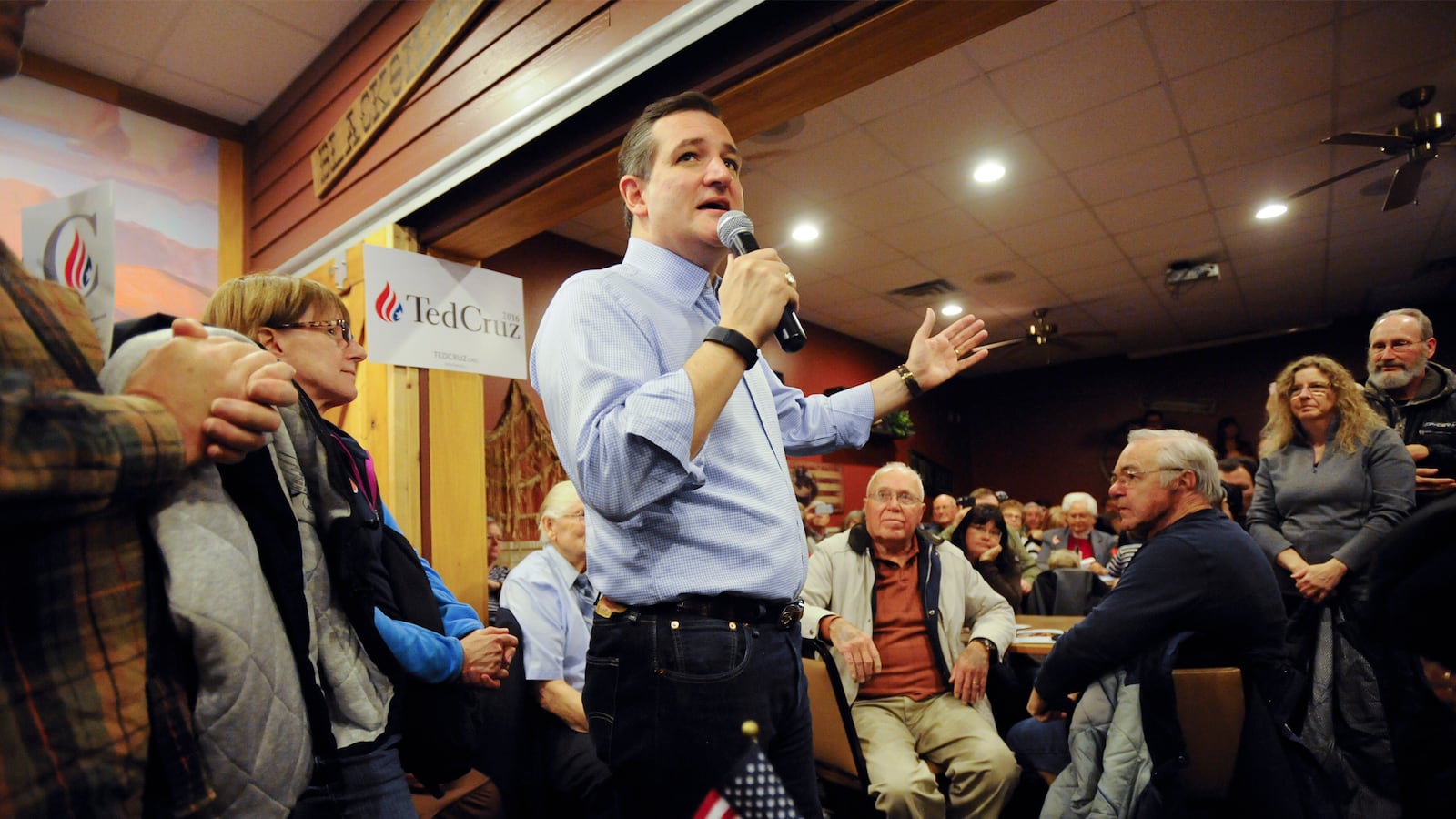On a recent episode of Red Eye with Tom Shillue, guest Alan Dershowitz opined that Ted Cruz, whom he taught at Harvard Law back in the day, was very “libertarian.” That’s news to me and it’s news to Rand Paul, the most libertarian-leaning contender for the GOP presidential nod, who tweeted the following New Year’s resolution: “I resolve to give @TedCruz more lead time before I announce my policy positions, so he can replicate them faster.”
Indeed, to most libertarians I know, Cruz comes across as a conservative pretty much straight out of Central Casting—the retro-wet-look hair even invokes the late, unlamented Sen. Joe McCarthy. Sure, he peppers his conversations with references to Ludwig von Mises and Friedrich Hayek, two “Austrian School” economists important to libertarians, and he genuflects regularly in the direction of cutting the size, scope, and spending of government (one loose definition of libertarian politics). That is, unless you’re talking about defense spending, which can always be jacked up even without paying for any increases.
The plain truth is that Ted Cruz is not at all libertarian, but if he wants to succeed in the GOP nominating process—and especially the general election in November—he might want to start following Mises rather than merely invoking him. “Men are fighting,” Mises, an arch internationalist and cosmopolitan, once surmised, “because they are convinced that the extermination of adversaries is the only means of promoting their own well-being.”
Such sentiments are very much at odds with Cruz, who has ranted about carpet bombing the Middle East so that we will be able to answer—finally!—the age-old question of whether “sand can glow in the dark.” Libertarians are not pacifists or isolationists by any stretch of the imagination, but neither are we at one with the war hysterics possessing the folks gunning for the GOP (and Democratic, if you’re Hillary Clinton) nomination.
As a rule, libertarians also support making the borders more open to more people and goods from abroad, while Cruz is arguably even more anti-immigrant than Donald Trump. Trump, after all (PDF), would let the “good” Mexicans back in after deporting them. Meanwhile, Cruz’s flip-flopping on trade-promotion authority and the Trans-Pacific Partnership seems far more motivated by politics than principle.
And it seems that Cruz rarely goes a day without palling around with death-to-the-gays evangelicals and insisting that “any president who doesn’t begin every day on his knees isn’t fit to be commander-in-chief of this country.” That sort of thing alienates all the libertarians I know, none more so than the religious ones who especially want to keep government and faith separate (so that politics doesn’t befoul religion).
Unfortunately for Cruz, alienating libertarians is no way to win the GOP nomination or the White House. While he’s leading polls going into the Iowa caucuses at the start of February, he’s only in the third place in New Hampshire (behind Donald Trump and Marco Rubio) and he’s 20 points behind The Donald nationally. He’s in a dead heat with Hillary Clinton in head-to-head matchups. When it comes to the general election, Republican candidates have won a majority of the popular vote only once since 1988 (that was George W. Bush, in 2004). Come November, Republicans will need all the votes they can get—and those votes are not going to come from the dwindling number of hard-core social conservatives that reliably turn out for the Republican nominee.
They might, however, come from libertarian-leaning voters, especially if the GOP could drop its culture-warring and actually live up to its endlessly professed ideals of making the government smaller in all areas of our lives. Two scholars at the Cato Institute, David Boaz and David Kirby, argue that about 15 percent (PDF) of the American electorate is reliably libertarian—that is, socially liberal and fiscally conservative—and that upwards of 70 percent of them will vote for Republicans when offered a candidate not overly noxious to the full range of libertarian sensibilities. Pollsters at Zogby, Gallup, and Pew find larger percentages of libertarians based on responses to questions about the role of government in promoting morals, regulating the economy, and providing basic goods and services.
In any given national election, the libertarian vote is enough to swing things in one direction or another. That may also hold true in various Republican primaries too. And for all his reactionary positions, Cruz does approach libertarian sensibilities in some meaningful ways. He’s in favor of strong Second Amendment rights and among the GOP hopefuls, he is second only to Rand Paul on ending bulk collection of metadata and reining in the surveillance state. He has been outspoken against idiotic and environmentally destructive corn-based ethanol mandates, a position that surprisingly hasn’t hurt him in Iowa.
And Cruz says that he is a strong federalist, meaning that most political decisions should be pushed down to the most local and theoretically representative level possible among federal, state, and local governments. This is why he talks about having the definition of marriage decided by the states rather than the federal government.
Of course, had the Supreme Court ruled differently last year on the matter, one assumes Cruz would be OK with that, too, because he rarely misses an opportunity to invoke “traditional marriage.” That’s the main problem with federalism in the end: It is always results-driven and depending on what a particular person wants in a given situation, he will always claim an exemption to a general rule. Just ask the Democrats during the contested 2000 election, when they reversed everything their party stood for and insisted that no, really, the Florida vote was a state issue. And ask the Republicans who insisted that no, really, the fate of Terri Schiavo was a pressing concern for the federal government.
The state’s rights positions Cruz typically takes are not libertarian, David Boaz told me in a recent interview. “A firm federalist would push for the repeal of federal drug laws,” said Boaz, the executive vice president of the Cato Institute and author of last year’s The Libertarian Mind. “Cruz doesn’t do that.” Cruz also believes the federal government should govern abortion, which makes you wonder why he thinks gay marriage should be left up to the states.
That said, there’s overlap on some issues that might provide common ground between Cruz and libertarians. Cruz has recently “evolved” on marijuana and, after attacking President Obama for failing to enforce federal law in Colorado and Washington, now says he’s open to the states experimenting with legalized pot.
Boaz rightly observed to me that Cruz turns off libertarians “with his heavy emphasis on evangelical issues” such as gay marriage and abortion. The apocalyptic extremity of his rhetoric is off-putting even beyond its contents and there’s a strong case that Cruz has blown up any possible of rapprochment with libertarian voters. But he—and the rest of the GOP field as well—would do well to start courting libertarians if they’re serious about driving all the way to the hoop in the 2016 campaign. Whoever becomes the Republican nominee is in luck, for he will almost certainly face Hillary Clinton, a candidate as repugnant on virtually every level as the current crop of Republicans. On the other hand, there’s a reason why most current candidates are dead even with her in hypothetical matchups. And it’s not because the GOP is insufficiently hateful toward gays, Syrian refugees, and Ebola patients.
The 15 percent—or more—of the electorate that reliably trends libertarian and have shown a willingness to vote Republican in the past are out there, but it won’t vote GOP unless they believe the party is serious not about praying and making sand glow but about reducing the size and scope of government. That may be too much to ask for, even and especially from a candidate and party that is constantly talking about smaller government. But it’s hard to see many libertarians pulling the lever for anybody who only talks the talk.






